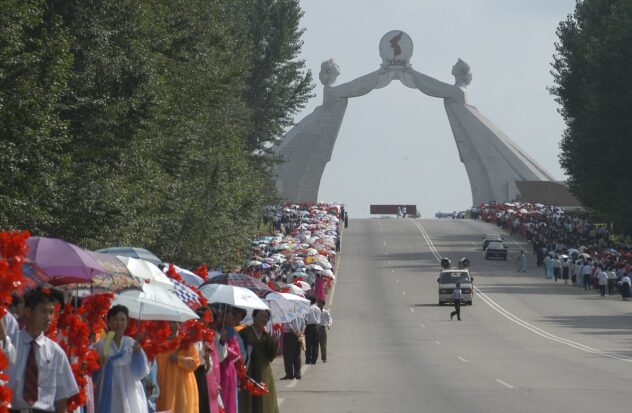North Korea is one of the most indecipherable countries in the world. With a leader, Kim Jong-un, always ready to press the red button of the nuclear threat (like his ally, Vladimir Putin), and in constant tense calm with its southern neighbors. The North Korean regime has many curiosities, and one of them is its system for classifying society.
As in any society, North Korea has different social strata that define their population. There have always been classes, as they say. But in this case, It does not depend so much on oneself, but on the history of one’s family members.. A future marked by the past and that, furthermore, it’s almost impossible to change. Although North Korea denies its existence, the so-called songbun It is present in the daily lives of the country’s citizens.
A social system in which, depending on different social aspects of the life of their ancestorsNorth Koreans are classified as loyal or hostile to the regime. The word songbun means origin and is part of the expression chulsin songbun (family origin). And it affects everything in the life of a North Korean: from where he lives, your access to food or medicine and the possibilities of studying.
It is a system in which your worth is measured by the merits or faults of your ancestors and relativesexplains the BBC Yeonmi Park, activist and author of the autobiographical book Escape to Live: A Young North Korean Girl’s Journey to Freedom. Her testimony, like that of many others contrary to the regime who left the countrydetails the existence of this class system.
The history of songbun
Its origin takes place in the first half of the 20th centuryin a context in which Korea was subject to colonial rule of Japan, heir to a Confucian feudal society in which great importance was given to hierarchies. Behind the World War II turned into a division between the communist North (with the influence of Stalin’s Soviet Union) and the capitalist South (intervened by the United States).
The Korean War (1950-1953) It consolidated that division between both neighboring States, now irreconcilable. Kim Il-Sung (father of former leader Kim Jong-il and grandfather of current leader Kim Jong-un) He consolidated the dictatorship with a system of Stalinist influence, with constant ideological surveillance and regular purges, in which there were always more suspicious people and families.
Three social classes
Those who have the greatest privileges are the haeksim (which means core), the loyal. To this class, the highest, belong the descendants of those who They fought against Japan and in the Korean Waras well as members of the Communist Party and working-class families with a high degree of loyalty during decades. They are trustworthy and loyal to the Kims.
They are the ones who enjoy greater privileges in North Korean society, living in the most developed municipalities, with the possibility of studying at the best universities and with the best jobs. Furthermore, can live in the capital, Pyongyang, whose population of three million inhabitants, for the most part, makes up this class. Within the haeksim, there is a subclass above, with families close to the circles of power who can travel abroad and send their children to study abroad.
At the opposite extreme we find the choktaethe hostile. They are made up of traditional enemies of the regime, and this class includes children of landowners, businessmen or collaborators of the Japanese empire during the occupation or of South Korea during the war. Their blood is considered contaminated and they usually live in the poorer areas, with little access to foodelectricity or education, in addition to doing the hardest jobs.
The children of this caste go to school in the mornings, mainly for ideological indoctrination. They usually have a short life and subject to almost permanent surveillance by the authoritiesexplains Park. For them, it is practically impossible to live in the capital without obtaining legal permission to visit it.
And, as in everything, there is an intermediate zone between both extremes. Are the dongyo and they are not considered hostile, despite having a family history that is not completely clean. Their loyalty to the regime is questionable, but their conditions are not so harsh.despite being limited.
In case of do not have many spots, they can live near the capital, go to second-level universities or do administrative work. According to experts, it is the largest group (about 40%, compared to 30% for both haeksim and choktae).
Families sense to which class they belong, and it is usually common to try to find out (they are part of the classified documents of the State, local administrations and police) the songbun of another party in the case of marriages: If one of them has a lower class, the highest status automatically drops.
Follow the Diario AS channel on WhatsAppwhere you will find all the sport in a single space: the current news of the day, the agenda with the latest news of the most important sporting events, the most outstanding images, the opinion of the best AS brands, reports, videos, and some humor from time to time.



